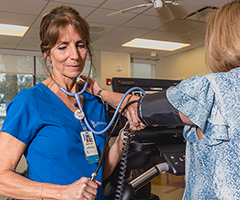Mitral Valve Prolapse
Lee Health: Southwest Florida's Trusted Cardiology Specialists Providing Mitral Valve Care
Lee Health cardiology specialists are ready to help you treat your mitral valve prolapse (MVP). Our team of specialists are here to provide you with exceptional care starting with helping you understand the early symptoms of mitral valve prolapse.
What is a mitral valve?
In order to better understand what a mitral valve prolapse (MVP) is, it is important to familiarize yourself with what the mitral valve is and the role it plays in your cardiovascular health.
The mitral valve is one of the four valves in your heart that ensure blood flows in the right direction. These valves, or flaps, open and close to let blood through or prevent backwards blood flow. Your mitral valve opens to let blood flow from the upper left chamber (atrium) of your heart into the lower left chamber (ventricle) of your heart. When the lower left chamber contracts your mitral valve will close to stop backwards blood flow.
-
Cardiac Critical Care
At the first sign of a heart attack, every second counts. Our emergency cardiac care team is available 24 hours a day at our four adult hospitals.
What is mitral valve prolapse (MVP)?
Mitral valve prolapse (MVP) is a common, usually benign heart disorder. Normally, blood should only flow in one direction, from the upper chamber into the lower chamber, but in the case of mitral valve prolapse this blood flow is disrupted . In MVP, the valve flaps don't work properly; part of the valve balloons into the atrium, which may be associated with blood flowing in the wrong direction, or leaking back into the atrium.
In most cases, the cause of MVP is unknown. In some cases, it appears to be an inherited genetic condition. Rarely, MVP may be caused by:
- Rheumatic fever
- Coronary heart disease
- Cardiomyopathy
- Atrial septal defects
Mitral Valve Prolapse (MVP) Symptoms
People with mitral valve prolapse often have no symptoms at all, but the most common symptoms of mitral valve prolapse are:
- Irregular heartbeat
- Fatigue
- Chest pain
- Panic attacks or anxiety
- Rapid heart beat (palpitations)
- Sensation of missed heart beats
- Shortness of breath
- Dizziness
- Intestinal problems (such as irritable bowel syndrome)
Mitral valve prolapse can be heard through a stethoscope. A small blood leakage will sound like a murmur. When the mitral valve balloons backward, it may produce a clicking sound. Both murmurs and clicks are telltale signs of MVP. An echocardiogram can confirm the diagnosis. You may also be asked to wear a Holter monitor for a day or two to continuously record the electrical activity of your heart (EKG).
-
Cardiology - Heart Institute at Bass Road
-
Cardiology - Heart Institute at Sanctuary
-
Cardiology - Heart Institute at Cape Coral Hospital
-
Cardiology - Heart Institute at Coconut Point
-
Cardiology - Heart Institute at Medical Plaza One
-
Cardiology - Heart Institute at Metro Parkway
Mitral Valve Prolapse (MVP) Treatment Options
In most instances treatment for mitral valve prolapse is not necessary, however regular checkups with your cardiologist are still recommended.
People with an abnormal mitral valve may need:
- Medications. If symptoms include chest pain, anxiety, or panic attacks, a beta-blocker medication can be prescribed. Ask your doctor whether you may continue to participate in your usual athletic activities. The use of antibiotics prior to some dental and medical procedures is no longer recommended by the American Heart Association.
- Surgery. In very rare cases, the blood leakage may become severe. In these few cases, the mitral valve may need to be surgically repaired or replaced.
- Lifestyle modifications. You may be able to prevent symptoms through certain lifestyle changes, such as limiting your intake of caffeine, avoiding certain medications (such as decongestants) that speed up your heart rate, and exercising regularly as recommended by your doctor.
What is Lee Health's approach to mitral valve prolapse treatment?
Lee Health's cardiology specialists provide the most advanced valve repair/replacement surgeries and treatments using a multidisciplinary approach. Lee Health regularly handles the most complex cases in the region with excellent outcomes.
Lee Health is a leader in the use of robotic surgery for valve replacement. Robotic surgery makes it possible to perform valve surgery through smaller incisions with greater control and accuracy. Lee Health was the first in the region to perform valve surgery with robotic assistance.
Who should I contact?
If you have symptoms of mitral valve prolapse contact your doctor. If you do not have a doctor, call Lee Physician Group at 239-481-4111 or our cardiothoracic surgery group at 239-343-6341.





















































































